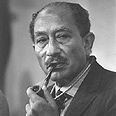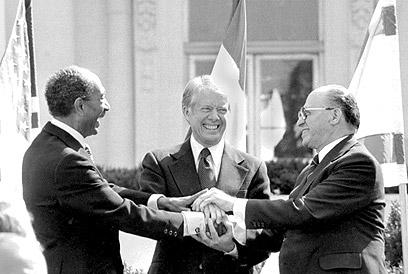
Under the sensationalist title of 'Assassination of a Pharaoh' – a new Iranian film exalting the assassination of late Egyptian President Anwar Sadat has stirred outrage in Cairo.
According to a report by Egyptian daily 'Al-Masri Al-Youm' on Sunday, the film asserts the motive behind Sadat's assassination in 1981 was his 'traitorous' decision to forge a peace agreement with Israel. (In the broader sense, radical Islamist movements in Egypt viewed Sadat as a collaborator with the decadent West – A/N.)
The film, broadcast "in honor of the martyrs of the Islamic renaissance," deals with "the revolutionary assassination of the treacherous Egyptian president at the hands of the martyr Khaled Islambouli," the paper said.
Islamic militant Islambouli was one of the soldiers who shot Sadat dead at a military parade in Cairo on October 6, 1981. He was hanged for the killing in 1982 and subsequently had a Tehran road named after him.
The film goes on to present an hour's worth of testimonies given by “experts, politicians and security officials," who discuss the assassination.
‘Falsifying history'
"The producers should have asked for the family's authorization before making the film," said Sadat's daughter, Roqeya. "Such slander will receive a strong response."
Making this film is a low attempt to tarnish the image of the man and falsify history," said Sadat's nephew and parliament member Talat.
Chairman of Egypt's Cinema Industry Chamber, Mamdouh El-Leithy, also commented on the production: “This film has nothing but lies. The Iranians should go back and reexamine it, because Sadat was a genuine hero. Without him we would have never gotten Sinai back. What he did with Israel is now being done with Syria, with Palestine and with other countries that opposed his decision."

Sadat, Carter and Begin sign the Camp David Accords, 1978 (Photo: AP)
But this isn't the first display of admiration for Islambouli from Tehran, where there is a street named after the assassin. Iran cut its diplomatic ties with Egypt in 1980 over the peace agreement with Israel and Cairo's decision to offer the exiled Shah sanctuary.
However, as part of recent attempts to reconcile the two countries, Iran has re-christened the street “Palestinian Intifada St.”
'Sadat was a great man'
Egyptian screenwriter Wahid Hamed says treating the film as a professional cinematic endeavor is the wrong approach and argues it is merely an informative video.
"This is born of Iran's policies as a nation. This has been their stance for a long time now, to the point where they've named a street after Islambouli… what the Iranians have done does not require a diplomatic response but rather a professional one to counter these senseless claims," he said, adding that in his belief the commotion surrounding the film will likely die down over the course of the coming days.
It is interesting to note then that the 'Al-Jamaa Al-Islamiya' movement, from whose ranks Islambouli emerged, has come forward in Sadat's defense. The group says it objects to the portrayal of Sadat as a
traitor. This, of course, could very well stem their fear of the Egyptian regime.
A senior member of the movement, which was outlawed following the assassination, told the Egyptian daily that Sadat "was a great man who was responsible for the October Victory (the Yom Kippur War).
"Khaled Islambouli, Sadat's killer, was a good young man who thought he was doing a good thing. However, the Al-Jamaa now believes that if it were possible to turn back time, it would never have happened. Sadat was the only president who gave the Islamic movements free range, but the movement did not make good use of that freedom."















